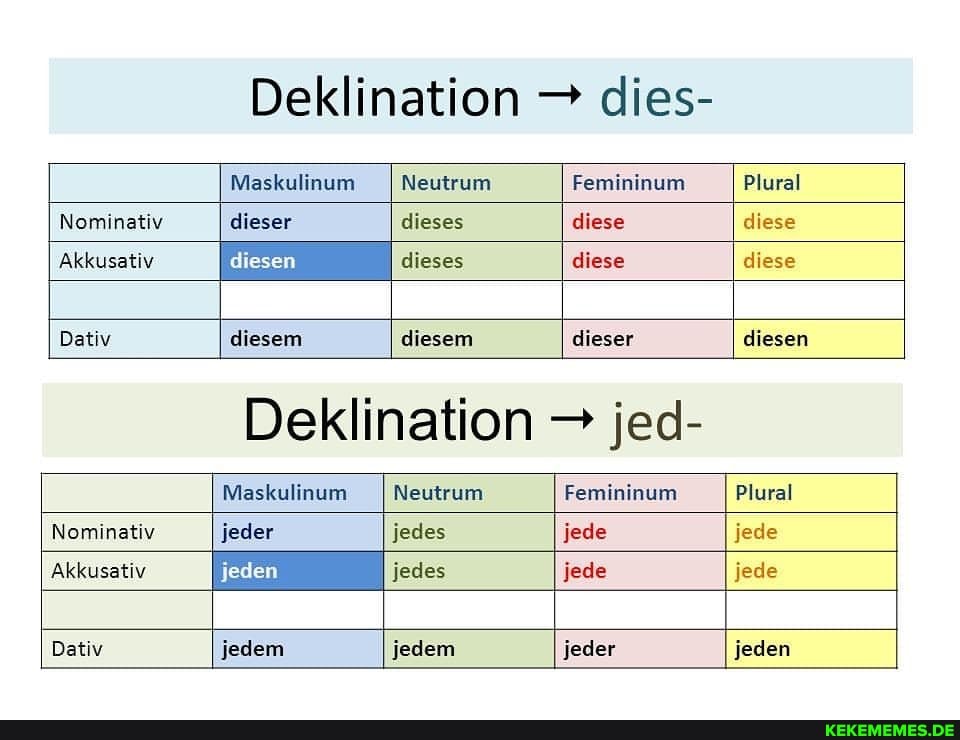
MiniTesteDich Anwendung von diese… English ESL worksheets pdf & doc
Grammar; dieser / jener Die Demonstrativpronomen dieser und jener werden als Demonstrativartikel oder allein stehend (außer im Genitiv) als Stellvertreter eines Nomens verwendet. Dieser weist auf etwas hi… Genitiv 'dieses/jenes' und 'dieser/jener' als Stellvertreter eines Nomens In der heutigen Standardsprache können die Genitivformen dieses, dieser, jenes, jener nicht allein stehend als.

Dieser, dieses oder diese? Learn when you have to use which Demonstrativpronomen YouTube
Demonstratives are used as pronouns or determiners, and they are inflectable, or more precisely, declinable (an exception is the pronoun ' selbst '). dieser, diese, dieses ( this, these, sometimes: that, those) „ Die da kenne ich." (I know that one.) „Besser ist dieses dort." (That one there is better.)

독일어 초급 3 Lektion 30 말하기 연습 (지시 대명사 dieser diese dieses) 199 YouTube
dieser/jener. Die Demonstrativpronomen dieser/diese/dieses und jener/jene/jenes können ohne Nomen (als Ersatz) oder mit Nomen (als Begleiter) verwendet werden. Mit ihnen wählen wir etwas Bestimmtes aus einer Gruppe aus. Beispiel: Welches Auto möchten Sie kaufen, dieses [Auto] oder jenes [Auto]? Welches Kleid soll ich anziehen?Dieses

Deklination dies Maskulinum Neutrum Femininum Plural Nominativ dieser dieses diese diese
Declension forms of dieser. The declension of dieser as a table with all forms in singular (singular) and plural (plural) and in all four cases nominative (1st case), genitive (2nd case), dative (3rd case) and accusative (4th case). Especially for German learners the correct declension of the word dieser is crucial.

DEKLINATION DIESER, DIESE, DIESES Deutsch lernen, Deutsch, Deutsche sprache lernen
The demonstrative determiners "dieser", "diese", "dieses" Demonstrative determiners are used to refer more specifically to someone or something or to differentiate a particular person or object from a larger group. For example, when Harry discovers a few strands of gray hair, he can point to one of them and use the word "diese" - indicating.
Dieser, dieses, diese Quiz
Declension German article dieser with plural and genus. The declension of the article dieser is in singular genitive dieses and in the plural nominative diese. It is a pronoun used as a demonstrative article. Following adjectives are weakly declined. One can not only inflect dieser, but all German articles.
dieserdiesedieses ? Group sort
Demonstrativartikel dieser, diese, dieses. Der Demonstrativartikel dieser, diese, dieses entspricht in seiner Funktion dem bestimmten Artikel. Deswegen wird er in der Umgangssprache oft durch den bestimmten Artikel ersetzt. Grundsätzlich stellt dieser eine zusätzliche Betonung des Artikels dar. Geben Sie mir dieses Brot.
Dieser, diese, dieses Quiz
Dies vs Diese - what is the rule to follow. These are newspapers. Newspaper is die Zeitung, plural is die Zeitungen. Since this plural has die as an article, I thought this should be diese (because with die it's meine, deine and so on). The system I'm using to learn (duolingo) states the translation should be:

Demonstrativpronomen Arbeitsblatt Mark Clifford Schule
The nice thing about the pronouns dieser, diese and dieses is that they are declined the same way as der, die and das. But we will talk about that in more detail below! Now, welch- (which) is an interrogative pronoun that asks for a definite article and thus for a certain selection. Let's have a look at the examples.

dieserdiesedieses Deutsch DAF Arbeitsblätter pdf & doc
dieser Pron. m. diese Pron. f. dieses Pron. n. Das verstärkte Demonstrativpronomen ist eine nur im Westgerm. und Nordgerm. vorkommende Zusammensetzung, die ursprünglich aus den flektierten Stammformen des unter der, die, das (s. d.) behandelten Demonstrativums und einer indeklinablen mit s- anlautenden deiktischen Partikel (älter anord.-si, sonst -s oder -se) besteht.

Deutsch Artikel, Demonstrativartikel, Possessivartikel, der, die, das, dieser, diese, dieses
Demonstrativpronomen are: der, die, das, dieser, diese, dieses, jener, jene, jenes and their respective declined versions. We use Demonstrativpronomen to emphasize something. They are always strongly stressed. They can be used as a placeholder for a previously mentioned noun. There are different Demonstrative Pronouns.

Verwendung Erklärung Demonstrativpronomen DeutschAkademie
dieser (demonstrative) this one, this; that one, that; Usage notes [edit] See dieses and dies for the use of these two variants of the nominative/accusative neuter. Unlike English "this", German dieser is not necessarily restricted to what is close to the speaker.

Deutsche Demonstrativpronomen dieser dieses diese A2 [with Jenny] YouTube
In this video you will learn how to form AND when to use the German demonstrative pronouns "dieser, dieses, diese.". Together with example sentences and qu.

Język niemiecki dla początkujących (16) Dieser, diese, dieses (ten, ta, to) YouTube
Grammar 'dieses/jenes' im Genitiv Singular Im Allgemeinen werden dieser und jener wie Adjektive ohne Artikel (starke Flexion) flektiert. Im Unterschied zu den Adjektiven wird aber der Genitiv Singular Maskulin und Neutrum m… Genitiv 'dieses/jenes' und 'dieser/jener' als Stellvertreter eines Nomens In der heutigen Standardsprache können die Genitivformen dieses, dieser, jenes, jener nicht.

Видео урок Показателното местоимение dieser, dieses, diese
The demonstrative articles dieser, diese und dieses (this/these) have endings that agree with the noun that follows. Ich mag dieses Lied. (das Lied) I like this song. In dieser Stadt ist viel los. (die Stadt) There's lots to do in this city. Dieser Mantel gehört Tim. (der Mantel) This coat belongs to Tim. Here are the endings used for each.

اهم الادوات الالمانية (9) dieser,diese,dieses RMpro
Demonstrative pronouns are used to point at people or things.They can sometimes even have a nominal or attributive function: "Hier liegt diese Hose und dort liegt jene. "dieser / diese / dieses" refer to closer things or people. "jener / jene / jenes" refer to people or things being further away. In the singular, they are adapted to the gender, number and case of the noun they refer to.